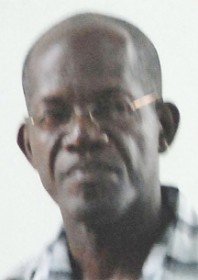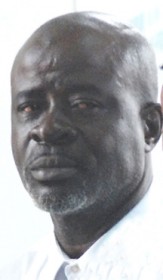–Full Court finds DPP decision irrational
Director of Public Prosecu-tions (DPP) Shalimar Ali-Hack exercised irrational reasoning and acted outside her powers when she advised that Roderick Peterkin and Maurice Smith be charged in the pink suitcase narcotics matter.

Her decision to advise that they be charged was quashed in Full Court proceedings yesterday and Peterkin and Smith were freed of the charge of conspiring to traffic in narcotics. Justices Roxane George and William Ramlal presided over the case.
Former Aviation Security Agent Peterkin and Police Constable Smith had made applications through their attorney Nigel Hughes for Writs of Certiorari. These were later granted by the full court and the DPP was ordered to show cause why her advice to institute conspiracy charges against the two persons charged after the pink suitcase cocaine bust should not be quashed.
Justice George, who read the court’s ruling, said “the DPP’s decision as evidenced by her written advice to the police is irrational in the application of law… Her conclusions in the assessment of the evidence as disclosed in the advice are irrational and therefore obviously ultra vires.”
Further, a letter which Ali-Hack wrote to Commissioner of Police Henry Greene about Smith’s conduct in an earlier incident on October 15 last year “clearly confirms the appearance of bias which the applicant has alleged”.
“This ruling,” Justice George further read from the decision, “cannot and should not be considered as indicating that challenges to the advice of the DPP can be routine.”
Decisions of a DPP, Justice George explained, are reviewable only in exceptional circumstances and if these do not exist then the decision of the DPP cannot and should not be reviewed. Despite this, decisions by the DPP are not immune to judicial review by the court. It has long been established, she said, that the court, using its supervisory jurisdiction, can review such decisions. The case of Tappin versus Lucus was cited in this instance.
In their applications, Justice George continued, Peterkin and Smith asked that the

court uphold that the decision of the DPP as contained in the letter of advice sent to the police was unreasonable and therefore ultra vires and/or perverse; and that, in the case of Smith, the issue of bias looms large so that the DPP should have recused herself from advising on the charge and having failed to do so her advice was also ultra vires.
Peterkin and Smith, along with Customs Anti-Narcotics Unit (CANU) employees Muniram Persaud and Shemika Tennant, were charged with conspiracy to traffic in narcotics on March 11; just two months after a pink suitcase with over 50 pounds of cocaine slipped through the Cheddi Jagan International Airport (CJIA), Timehri and was later intercepted by US authorities. They were released on $35,000 bail each.
The joint charge alleges that on January 12, at CJIA they conspired with each other, Dorothy Sears and with other persons unknown to export 24 kilogrammes, 600 grammes of cocaine. Sears had been busted with marijuana in her brassiere and the pink suitcase containing the cocaine at the JFK airport in New York.
Letter of Advice
In the said letter of advice to Crime Chief Seelall Persaud the DPP wrote: “Firstly I wish to state that this offence was committed since the 12th of January, 2010 and this file only came to these chambers for legal advice on the 12th March, 2010, contrary to what was published in the press one day in February that the file had come here then for legal advice.
“According to SC Adams he was working at the internal scanner operating the monitor. In the room with him at the time were a police officer and PC Gordon, and a CANU officer, Shemika Tennant. While viewing the monitor he saw a suitcase with square objects that appeared dark and he told Tennant to pull the suitcase to be checked.”
Tennant, Ali-Hack wrote in the letter, left the room, took the suitcase and subsequently said that she suspected the pink suitcase had money in it.
Later, she said, that Persaud told her not to search the suitcase because it belonged to his relative, it contained money and the needed customs document was already inside the baggage.
After looking at CCTV footage it was found that Muniram and Tennant, who’d originally gone into the scanning room, exited and went south. It is suspected that they put the suitcase on the baggage cart without inspecting it. There is evidence, Ali-Hack wrote, that they knew of the substance in the pink suitcase.
The following is a later section of the same letter: “This was not a suitcase with one package among other items in the suitcase. There were twenty-two bricked packages in one small suitcase…“Given this quantity of cocaine it ought to have been detected by the dog. This is further supported by the US CBP Canine that alerted the officials to the suitcase at JFK. This ought to have been done at CJIA.
“Based on the aforesaid evidence in this file there is sufficient evidence that the following persons conspired to export the suitcase of cocaine from Guyana to the USA: Muniram Persaud, Shemika Tennant, Roderick Peterkin and Maurice Smith.
“It is therefore advised that Muniram Persaud, Shemika Tennant, Roderick Peterkin and Maurice Smith be jointly charged with the offence of aiding and abetting to traffic in narcotics… they be dismissed before the charge… should be asked to state why they should not be dismissed.
“The aforementioned airport staff in conspiring to traffic the cocaine not only committed an offence here in Guyana but they also committed offences contrary to the laws of the USA.”
Ali-Hack further instructed the Crime Chief that Mark Chan not be asked to give a statement as it related to Smith’s duties since this case was the second in which his name was linked to cocaine.
“In light of the aforesaid it is advised that the aforementioned Roraima employees who are not to be charged criminally be permanently transferred from CJIA. If the management of Roraima Airways does not comply with this recommendation it is advised that the services of the Roraima Airways at the Airport be reconsidered.”
In her advice to the Crime Chief, Ali-Hack said the group should be charged with aiding and abetting but despite this they were leveled with conspiracy charges. This, the court said, “strongly suggests uncertainty as to what offence, if any, was committed”.
Letter to
Commissioner
Last October Ali-Hack and her husband were outgoing passengers at CJIA. After her suitcase fell from the baggage cart Smith then searched it. The DPP has since acknowledged this event.
In his affidavit, Justice George said, Smith “alleges bias in the DPP in that she had written to the Commis-sioner of Police requesting that he be dealt with condignly by the GPF because he had caused her suitcase and that of her husband to be searched at the airport when they were outgoing passengers on October 15, 2009.”
Later in a letter to Commissioner of Police Henry Greene Ali-Hack wrote: “Smith not only acted indiscriminately but unlawfully in threatening me and Mr Hack that we could not leave on the flight if the suitcase was not opened.” She questioned the commissioner about whether Smith’s superior at the time knew of the incident and whether he’d disciplined Smith. Ali-Hack went on to urge Greene to deal with the matter.
The DPP’s letter to the commissioner, according to the court, “clearly confirms the appearance of bias which the applicant, Smith, has alleged”.
Further, in his affidavit Smith gave evidence about the deficiencies of the sniffer dog, Argon, and these have since not been contradicted. No effort, Justice George repeated, was ever made to respond to the allegations about Argon’s deficiency.
With regard to this the court said: “Based on what the DPP outlined as the evidence upon which she was relying, there is no evidence to support the charge of conspiracy against this applicant (Smith) given that an important element of this offence is that there has to be an agreement among the alleged conspirators.
The DPP appears to have taken the view and concluded that the fact that the dog in the US allegedly sniffed the substance in the suitcase to be cocaine…and then the dog in Guyana should have also positively sniffed” and the fact that it did not was the basis for charging Smith.
After the court announced its decision to quash the DPP’s decision to advise the charges, Peterkin and Smith left the courtroom with smiles. “It was God’s work,” Smith told the media.





